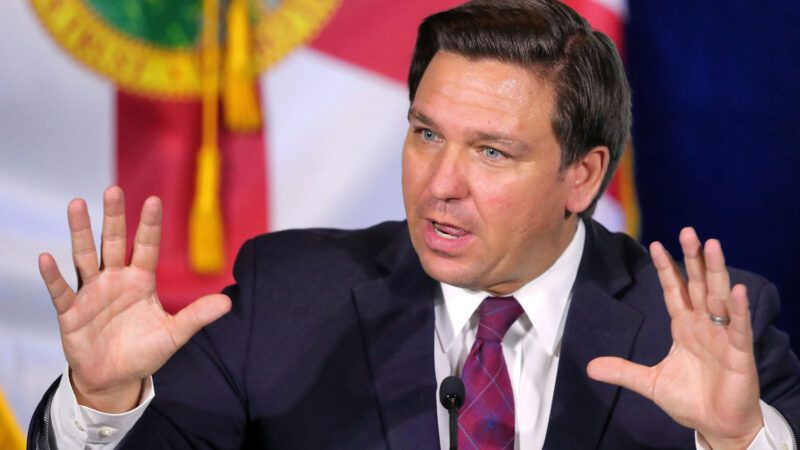Ron DeSantis Touted the Arrest of 20 People for Illegally Voting. Some Say They Were Told They Were Eligible.
The messy rollout of a constitutional amendment restoring voting rights to felons is now creating more felony crimes.

Last Thursday, Florida Republican Gov. Ron DeSantis held a press conference announcing the arrest of 20 people for illegally voting, many of them for voting despite having a felony record for murder or sex offenses.
"They did not go through any process, they did not get their rights restored, and yet they went ahead and voted anyways," DeSantis said. "That is against the law, and now they're gonna pay the price for it."
The announcement was a debut of sorts for the state's new Office of Election Crimes and Security, created as part of a package of tighter voting laws passed by the Republican-controlled Legislature. However, multiple news outlets have reported that many of those arrested for illegally voting thought they were eligible or said they had been told they were eligible.
The Tampa Bay Times reported that Romona Oliver, one of the arrestees touted by DeSantis, was asked if she had a felony record when she filled out paperwork to register to vote at the county tax collector's office. But Oliver, who had recently completed a 20-year sentence second-degree murder, was never asked if her right to vote had been restored. County officials don't verify eligibility; they simply send the paperwork to the state.
Oliver voted for the first time in her life in the 2020 presidential election. "It was exciting for me because I felt like after all that time, I want to get out and try to do the right thing," she told the newspaper. "Give back to the community."
Instead, she is now facing a third-degree felony, which carries up to $5,000 in fines and five years in prison.
Five of those arrested told the Tampa Bay Times that "they believed they were able to vote and had faced no issue registering."
Orlando outlet News 6 reported that three Orange County residents who were arrested for illegally voting all thought they were eligible. According to an arrest report for Jerry Foster, one of the men arrested for illegally voting, "Foster called the Orange County Sheriff's Office resident deputy assigned to sexual offenders and inquired about voting and the deputy reportedly told him that he could vote."
The confusion stems from Amendment 4, a constitutional amendment approved by Florida voters in 2018 to restore voting rights to those with felony records, except those convicted of murder or sex offenses. At the time, Florida was one of four states that imposed lifetime voting bans on felony offenders.
However, the implementation of Amendment 4 was bogged down in controversy. The amendment said that those with felony records would have their rights restored upon completion of "all terms" of their sentence, but it was unclear if this included court fines and fees. Republicans insisted that it did, while civil liberties groups and Democrats said that would amount to an illegal poll tax and bar many, if not most, felony offenders from getting their rights restored.
The Republican-controlled Legislature passed a bill requiring payment of fines and fees to restore one's voting rights. A federal judge, ruling in a civil rights lawsuit challenging the new law, declared that parts of the law were unconstitutional, but that ruling was overturned by the 11th Circuit Court of Appeals.
What became clear during the trial was that state officials, much less county officials, didn't have an easy way to check someone's eligibility against their criminal record or see how much they still owed in fines. That leaves the onus, and the risk of arrest, on the individual.
Florida State Sen. Jeff Brandes (R–St. Petersburg), who shepherded the bill implementing Amendment 4, tweeted last week that the Legislature never intended it to be used so harshly against those who accidentally voted.
As the author of the bill implementing amend 4 it was our intent that those ineligible would be granted some grace by the state if they registered without intent to commit voter fraud. Some of the individuals did check with SOEs and believed they could register. #Intentmatters https://t.co/3IXmSuIpSe
— Jeff Brandes (@JeffreyBrandes) August 19, 2022
The Florida Rights Restoration Coalition, a grassroots advocacy group that worked to pass Amendment 4, said in a press release that the Amendment "is very clear on who is eligible and who is not eligible to vote. When someone registers to vote, it is the responsibility of the state to determine an individual's eligibility prior to issuing a voter identification card."
"If Floridians can not rely on the government to verify their eligibility," the group asked, "who can they rely on?"
Such cases of harsh punishment for allegedly honest mistakes, or in some cases government mistakes, are not limited to Florida. Reason's Billy Binion wrote earlier this year about the case of Pamela Moses, a Tennessee woman who was sentenced to six years in prison for illegally registering to vote while on probation. Moses' probation officer had incorrectly signed off on paperwork stating that she had finished her probation. And there's the case of Crystal Mason, a Texas woman sentenced to five years in prison for voting while still on supervised release, a crime she says she was oblivious to.


Show Comments (63)